Korean Beef Bulgogi
This post may contain affiliate links. Please see our privacy policy for details.
A super easy recipe for Korean BBQ with the most flavorful marinade! The thin, tender slices of meat cook SO quickly!
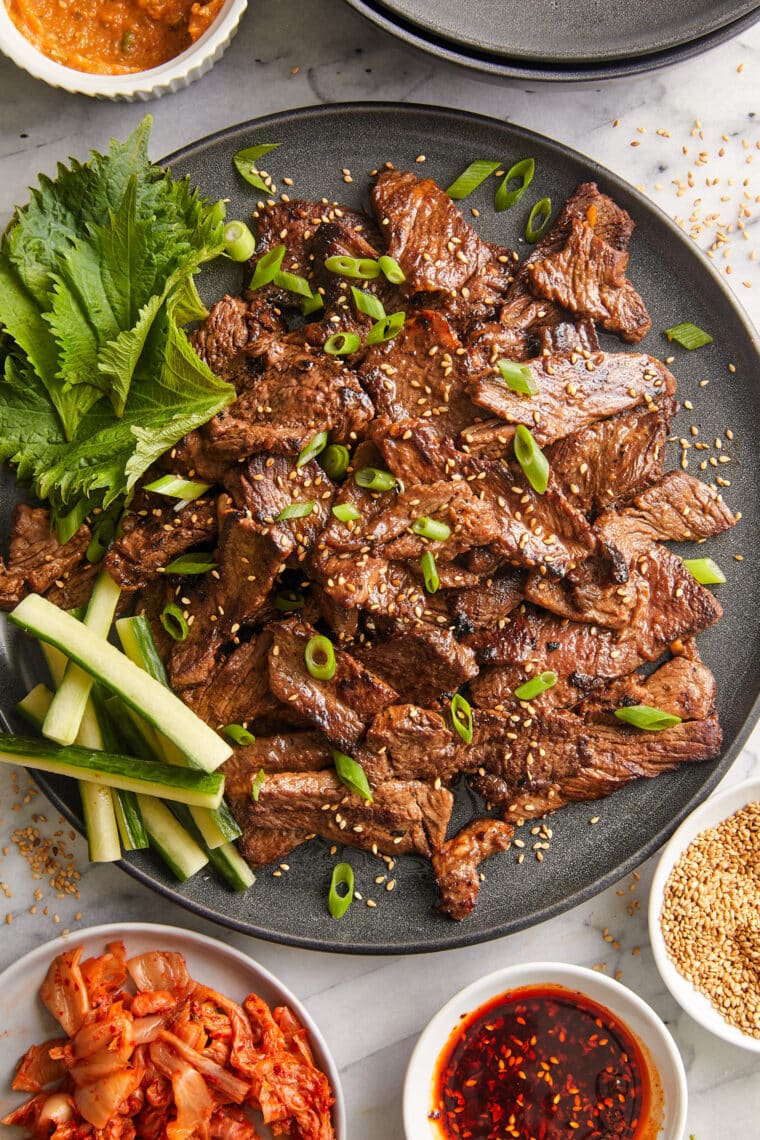
Featured Comment
It was always a treat when my mom would whip this up on those busy weeknights – marinating the beef just a few hours while I was at swim practice. And then she’d throw these onto a hot skillet, filling up the house with the best kind of beef aroma – you know, the smell at the Korean BBQ restaurants that gets you so hungry.
The meat cooked in seconds, and she’d serve these with perilla leaves, white rice, and ssamjang (best known as a Korean BBQ dipping sauce). It was just perfection. But with my mom being in Korea, she doesn’t really get a chance to make this for me anymore. So I’ve done my best to “grow up” and whip this up myself. Now to be honest, nothing beats my mom’s cooking but this is a very close second.
what is korean bulgogi
Bulgogi (불고기) is a Korean dish made of thinly-sliced meat typically marinated in soy sauce, sugar, sesame oil, garlic, ginger and pear. Bulgogi is most commonly made with beef, but can also be made with chicken or pork.
tips and tricks for success
- Freeze the steak for slicing. The key to bulgogi is using paper thin slices of meat. Throwing the steak in the freezer for 20-30 minutes will make it easier to slice the meat into very thin, even pieces. Pre-sliced bulgogi beef is also readily available at Korean and Japanese grocery stores.
- Pear adds maximum flavor. Adding coarsely grated pear will not only add a subtle sweetness to the marinade, but it will also help tenderize the meat. Korean pear or Bosc pear can be used.
- Use reduced sodium soy sauce. Reduced sodium has less sodium and less salt without compromising flavor.
- Use a hot cast iron grill pan. A heavy bottom pan, such as a cast iron grill pan, retains heat much better than a nonstick skillet, allowing for even cooking, a better sear and smoky, caramelized flavors.
- Cook in batches. Work in batches to properly sear the meat for maximum caramelization and smoky flavors. An overcrowded pan will unfortunately steam the beef instead.
- Freeze as needed. Marinated bulgogi is very freezer-friendly, great for meal prep and making weeknight meals even easier and quicker.
freezing and storage
Storage
Leftovers can be stored in an airtight container in the fridge for 2-3 days.
Reheating
Let the meat sit at room temperature for 10-15 minutes. Reheat over medium high heat, stirring frequently, until heated through.
Freeze before cooking
Transfer the marinated meat to an airtight, resealable freezer bag. Label, date and freeze up to 2 months. To cook, thaw overnight in the fridge and cook as directed, adding a few more minutes of cook time as needed.
Freeze after cooking
Let cool completely. Transfer the meat to an airtight, resealable freezer bag. Label, date and freeze up to 2 months. To reheat, thaw overnight in the fridge, reheating over medium high heat, stirring frequently, until heated through.
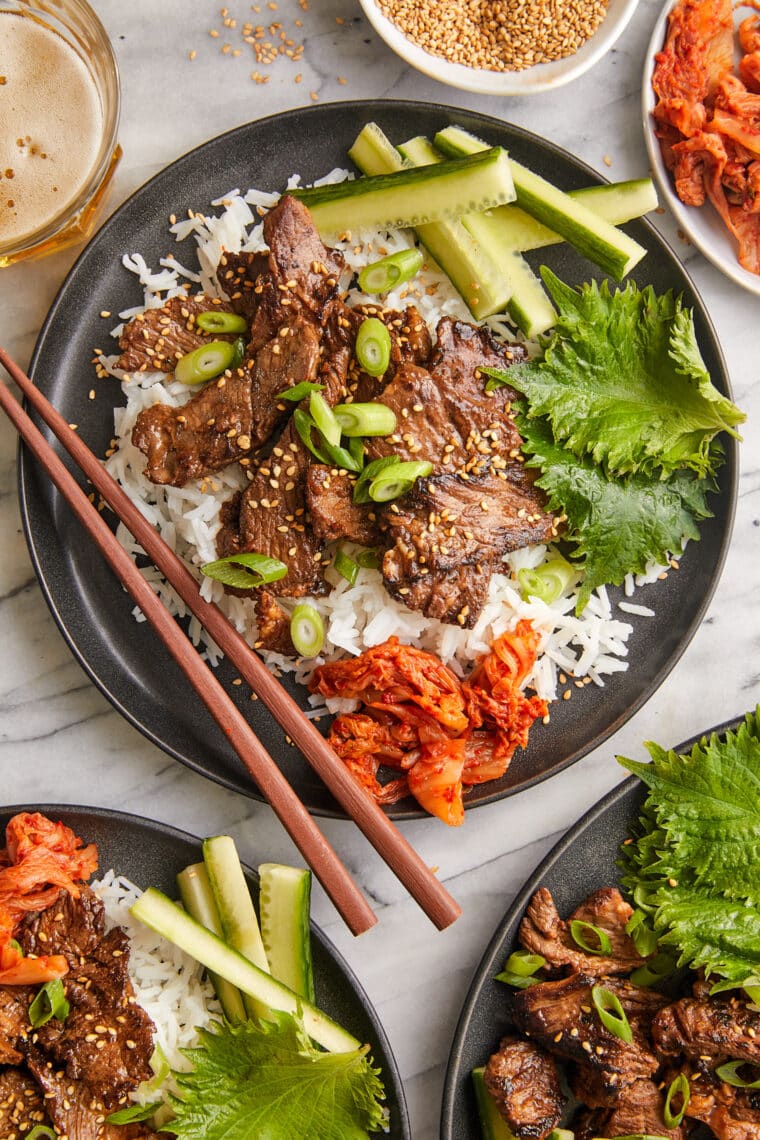
more favorited korean recipes
Tools For This Recipe
Cast iron grill pan
Korean Beef Bulgogi: Frequently Asked Questions
We prefer ribeye and top sirloin, but flank steak or skirt steak can also be used for a more budget-friendly option.
Fuji apple is a suitable substitute for the pear.
Gochujang is a red chili paste, a pantry staple in Korean cooking. It can be found in most grocery stores in a red, rectangular tub.
If you do not have a cast iron grill pan, you can also use a large cast iron skillet.
Bulgogi is commonly served with rice and a side of kimchi, cucumbers, perilla leaves and ssamjang.
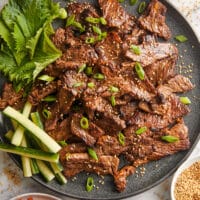
Korean Beef Bulgogi
Ingredients
- 1 ½ pounds boneless rib eye steak
- ½ small pear, peeled and coarsely grated
- ¼ cup reduced sodium soy sauce
- 2 tablespoons brown sugar
- 2 tablespoons toasted sesame oil
- 3 cloves garlic, minced
- 1 tablespoon freshly grated ginger
- 1 tablespoon gochujang, Korean red pepper paste
- 2 tablespoons vegetable oil, divided
- 2 green onions, thinly sliced
- 1 teaspoon toasted sesame seeds
Equipment
Instructions
- Wrap steak in plastic wrap, and place in the freezer for 30 minutes. Unwrap and slice across the grain into 1/4-inch thick slices.
- In a medium bowl, combine pear, soy sauce, brown sugar, sesame oil, garlic, ginger and gochujang. In a gallon size Ziploc bag, combine soy sauce mixture and steak; marinate for at least 2 hours to overnight, turning the bag occasionally.
- Heat 1 tablespoon vegetable oil in a cast iron grill pan over medium-high heat.* Working in batches, add steak to the grill pan in a single layer and cook, flipping once, until charred and cooked through, about 2-3 minutes per side. Repeat with remaining 1 tablespoon vegetable oil and steak.
- Serve immediately, garnished with green onions and sesame seeds, if desired.
Video
Notes
Did you make this recipe?
Tag @damn_delicious on Instagram and hashtag it #damndelicious!

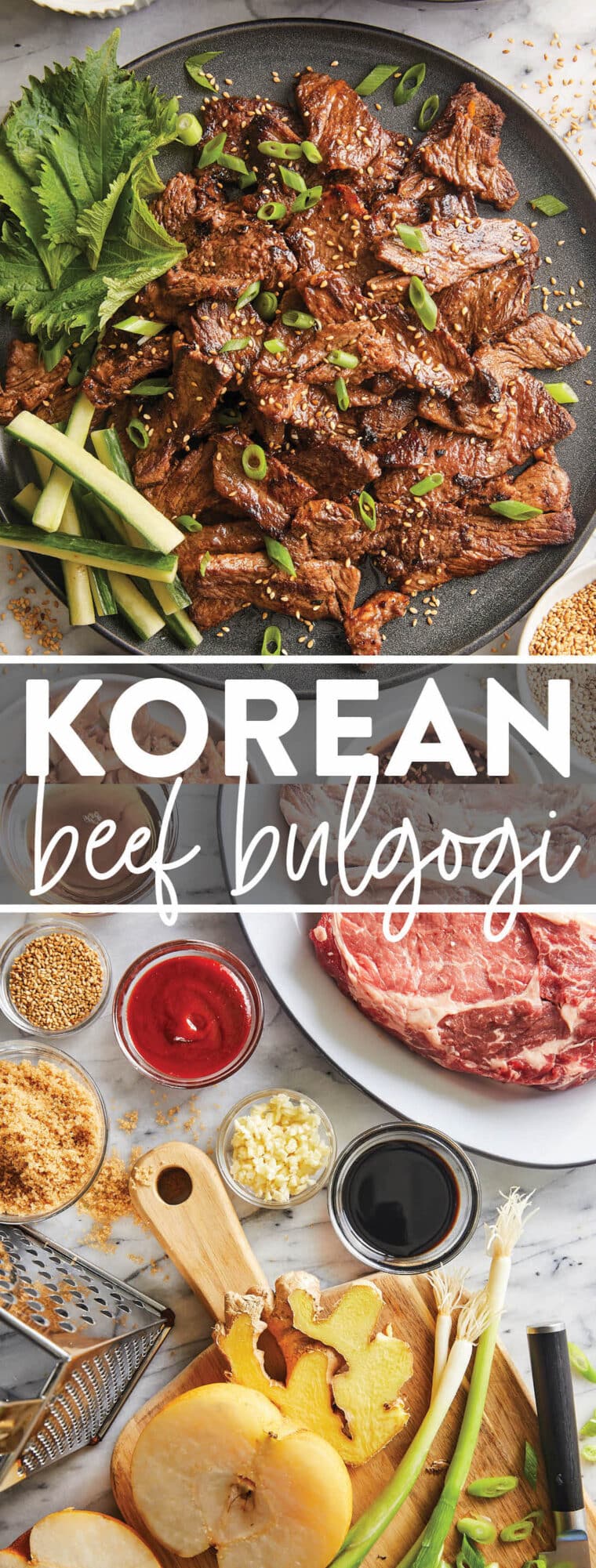
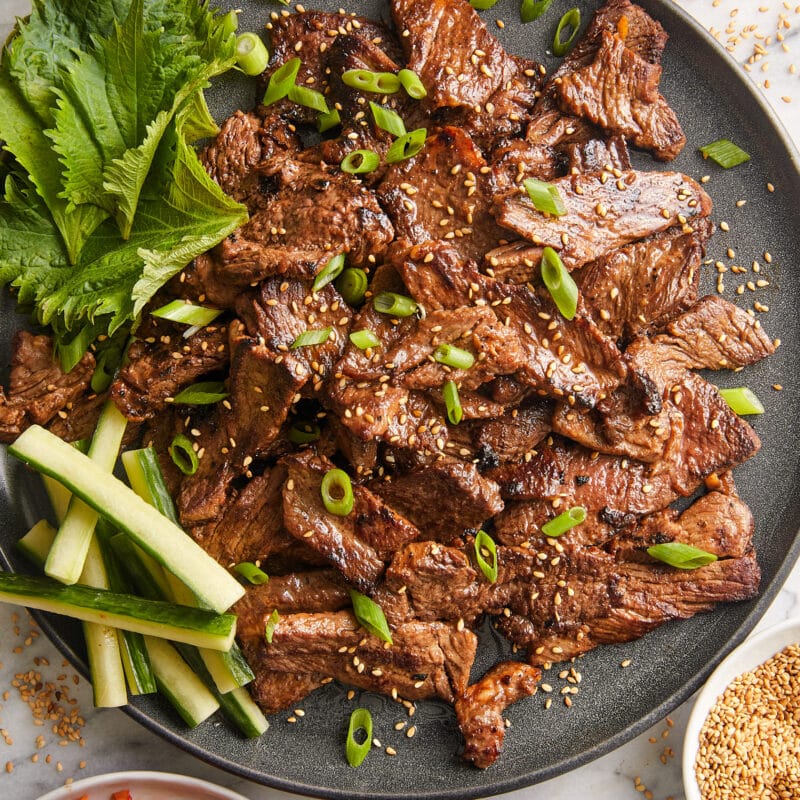




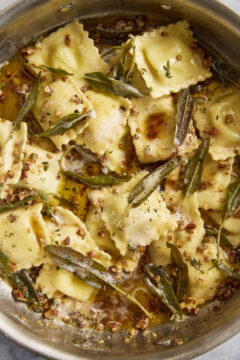


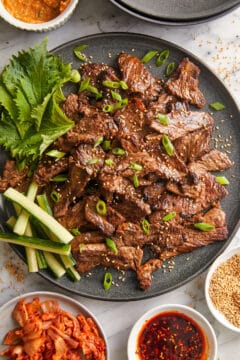

amazing
I did make this yesterday for a Pot Luck at work. I did a Filipino Korean fusion. I made siopao (steamed buns) with beef bulgogi, onions, green onions and Chayote as the filling. An instant hit. My Filipino mom who is also part Korean and Chinese asked me to make it solely for her.
Will make today . I can tell I will like it, Her recipe is easy to follow and the printed recipe is very, very well done.
I can almost taste it right now. Thank you.
“The key to bulgogi is using paper thin slices of meat.” – Yum! YES!
“Unwrap and slice across the grain into 1/4-inch thick slices.” – Where do you buy your paper? Probably 8 slices per inch is worth freezing.. you can slice raw meat into 1/4 inch slices.
Very good! Made with Korean style short ribs and was delicious!
I love this! Made it a few times now and saved it in my phone for future reference. Thanks for this, my favorite Bulgogi recipe!
Delicious!! I followed the recipe pretty much exactly and it came out perfect. I used top sirloin and an apple instead of a pear. It looked fantastic and tasted even better!! I’m definitely saving this and making again.
Tried beef bulgogi for the first time last month at a Korean restaurant and loved it, so I decided I wanted to try and make it myself. This recipe was so easy and came out sooo yummy!! Love how quickly it comes together too
Sooooo good! I actually did this using a homemade mock steak that my vegan Korean friend taught me to make; it it works beautiful even for the vegan version! I made it for dinner for my mother & I tomorrow. Can’t wait
Can I use pre cut thinly sliced sirloin instead of the ribeye?
It might be a little tougher, but it should work I made it once with Tri-tip that I’d tenderized and it came out great.
Delicious and easy to make! First time making and trying bulgogi, I’m hooked! I’m pairing it with Korean pickled cucumbers and white rice
Sounds amazing. Thanks for sharing, Lizbeth!
Delicious recipe. Do you happen to have the macros for this meal. I am trying to start recording these soon. Thanks for sharing the lovely recipes.
WOW! This is delicious! It was easy to prepare and tasted like it was made at a restaurant. I’ve tried other recipes but this one I’ll stick to. Thanks for sharing it!
Just here to pick up a quick bulgogi recipe, I just moved and can’t find my pile of kitchen notes yet… I liked your version a lot… I didn’t measure anything, but measuring is optional sometimes… I like ginger, so I used too much of two kinds… I’m doing some beef and some pork… never tried pork bulgogi, never even heard of it… so it will either be great, or the chef doesn’t get a tip!
Marinated overnight, so much flavor, came out amazing. I used a top round roast cut in half horizontally, then thinly sliced. Unfortunately, I didn’t have any pears so I subbed a grated apple. Can’t wait to try with a pear. Served with steamed broccoli and rice. Thank you for an easy dinner!
This recipe was so easy and so delicious. I used the same marinade to make some tofu and it also came out delicious. Thank you for the recipe!
I used this recipe to make 2 batches of bulgogi after having enjoyed it at well-rated restaurant. I found it was easy to make and the result was excellent. The only change I made after tasting the first batch was to add a bit more gochujang to suit my taste for a slightly spicier dish closer to the one I sampled in the restaurant. Also, I marinated the meat for a full 24 hours and I’d recommend doing so if you can. Thank you!
This recipe has become a staple in our home! I serve it over cauliflower rice with romaine lettuce and a Korean cucumber salad on the side. Absolutely delicious, every single time. Thank you for sharing!
We substituted pear with apple and it was delicious!
Super yummy! Will definitely be making again